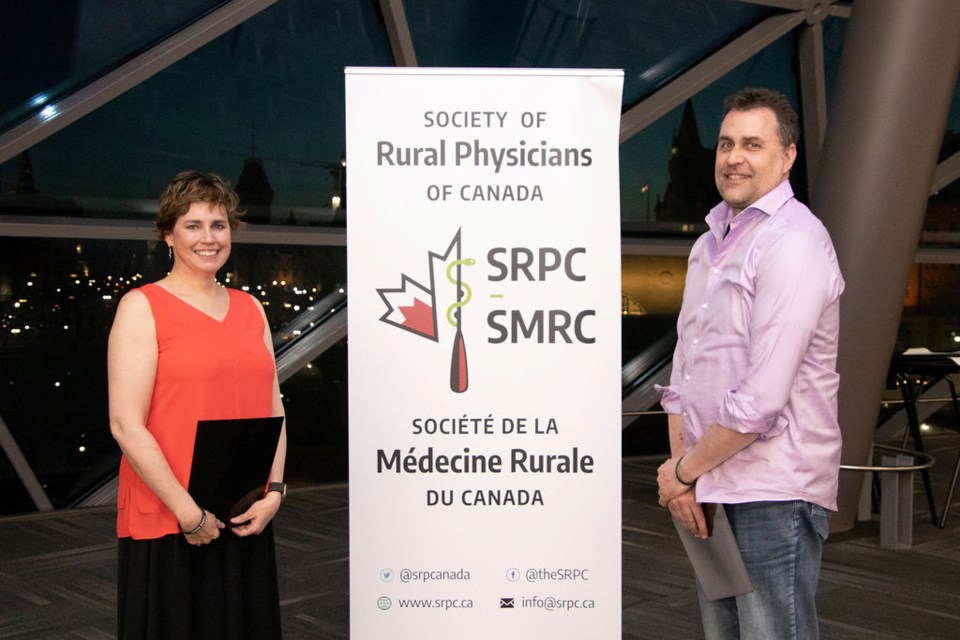SUNDRE — A couple of local doctors have joined the ranks of just a few Alberta physicians recognized nationally by the Society of Rural Physicians of Canada.
Dr. Michelle Warren and Dr. Rob Warren, who together own and operate the Moose & Squirrel Medical Clinic, recently returned from the society’s 29th annual Rural and Remote Medicine Course in Ottawa.
Michelle was presented with the Rural Long Service Award, while both her and husband Rob received the Fellowship of Rural and Remote Medicine. Dr. Gabe Woollam, a past president, and Dr. Margaret Tromp, chair of the nominations and award committee, presented the awards on Friday, April 22 at a gala during the society’s annual national conference.
“It is an honour because I think physicians that work in rural and remote communities are a unique breed,” Michelle said on Monday, May 9 during a phone call with Rob.
“It’s quite a club to be in,” added Rob. “They’ve been awarding fellowships since 2009 — only 20 of them have been awarded to Alberta doctors in that time. It’s a rare honour to receive, for sure.”
The society, which was founded in 1992, now has almost 2,000 members and the Warrens have never hesitated to renew their status with the organization, which bills itself as “the national voice” of rural physicians in Canada with a mission to “champion rural generalist medical care through education, collaboration, advocacy and research.”
The society, said Michelle, is made up not only of physicians who live and work in rural and remote communities, but also students and residents who are interested in practising rural and remote medicine.
“It gives you that support and that peer mentorship from physicians that live and work in a similar environment that you do,” she said. “Because it’s a very different practice than working say in downtown Calgary or Edmonton.”
Rural and remote health-care providers are expected to “be able to manage anything and everything that comes through the door,” she said, calling “a unique privilege” working with neighbours and members of the community who can become close friends over the years.
“It’s such a joy to be a part of their life, but it also increases the stakes when it’s someone that is close to you,” she said. “Whereas in the cities, you don’t tend to socialize with your patients, you don’t see them (in public), you don’t know who they are. And so it’s easier to leave at the end of the day and close the door. You can be anonymous in a city. You can’t in a small town.”
Additionally, she said the society hosts a number of informative workshops to teach and further develop skills that are critical for rural and remote health care.
“It’s a good resource for ongoing continuing medical education as well,” she said.
And last but certainly not least, she said the society also plays an important role in advocating on behalf of rural and remote communities in large part by encouraging both provincial and federal governments to recognize rural residents deserve top-level care.
Of course she acknowledges that not every hospital like the facility in Sundre can be equipped with a fully-loaded suite of high-tech diagnostic imaging equipment such as angiograms, MRIs and CT scanners.
“But all of those patients do deserve good quality health care in their own community,” she added.
Michelle was among eight physicians to accept the Rural Long Service Award, which in 2012 was first presented to recognize doctors who reside and work work in rural areas across the country. Recipients have previously received the Rural Service Award, served for at least 20 years or more in a rural setting, and maintain a society membership for the past five consecutive years.
The Warrens were also two of five physicians who accepted the Fellowship of Rural and Remote Medicine, which in 2009 was first presented in recognition of specialized expertise in the practice of rural medicine.
Visit srpc.ca/awards for more information about the awards and the society.



